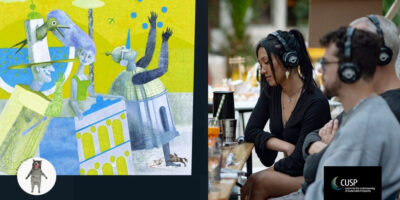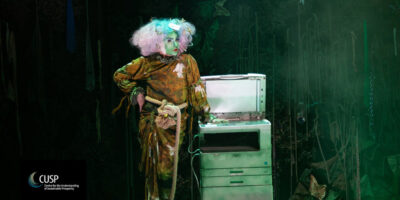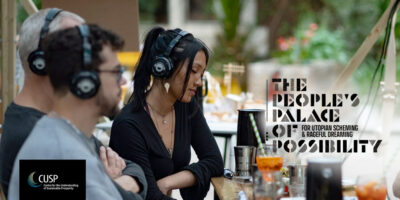The Light Tree Celebrations
CUSP researcher and Artsadmin’s Practice Researcher in Residence, Dr Malaika Cunningham, reflects on The Light Tree Celebrations—a festival marking the end of a three-year project undertaken by The Bare Project and The Canal and River Trust. The celebrations took place on Sunday 18 September 2022 in Sheffield. (This article also appeared on the Arts Admin website).
Blog by MALAIKA CUNNINGHAM
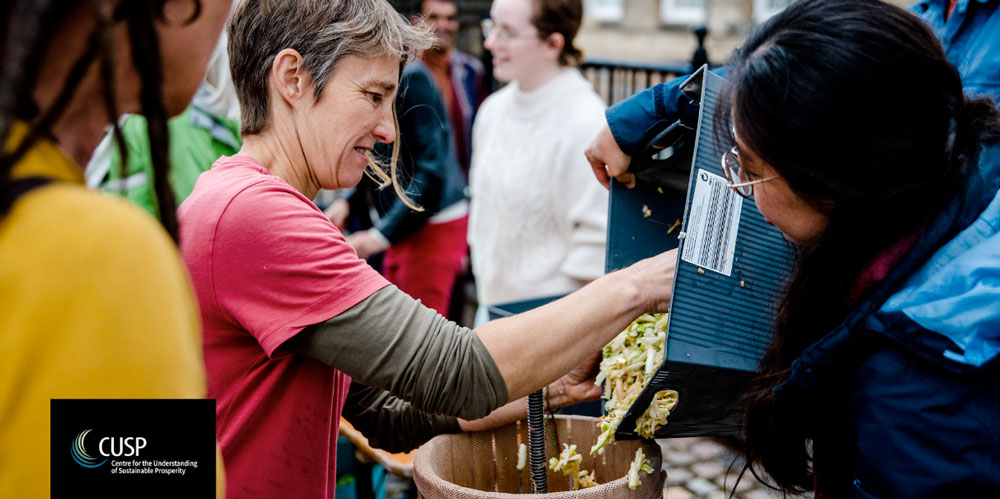
Let’s begin with a story.
“Once upon a time life went a little slack along the canal. Locals wandered around quays with their heads full of fog. No one stayed up talking about local politics, plotting revolutions, or singing rowdy songs. Too few fell in the water. Too few fell in love. They stopped being a good source of stories. And they desperately needed some good stories to clear this fog.
In response, three storytellers from the village left to try to find an exciting, mind-bending story, to bring back to the struggling community. They quickly made some adjustments to a barge to make it seaworthy and were off. They were gone for a year that felt like a decade.
When a small boy saw their boat returning, everyone quickly gathered: plumping cushions and making tea, ready to hear the promised Epic Tale. But when the trio stepped off their disintegrating boat they were completely silent. They did not smile with recognition or relief—instead they stared blankly ahead. Stranger still, they were each carrying a hessian sack stuffed with other-worldly seeds. Some of the seeds were bubblegum pink and helix-shaped, and one appeared to contain a miniature model of the solar system. The storytelling trio had returned from their travels as silent gardeners. No one could guess why. But very soon the canal towpaths bristled with peeking shoots and leaves.
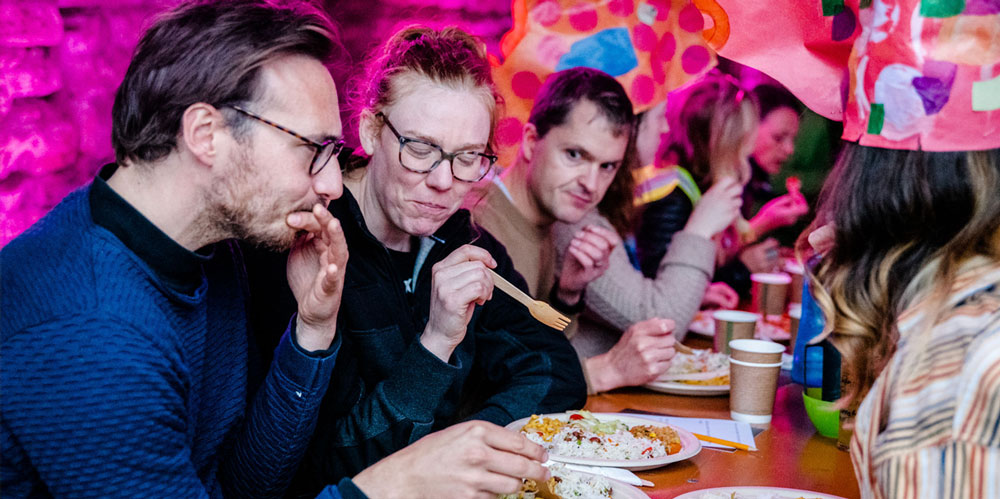
One evening a thunderstorm raced in from the West and threatened to wash away all the seedlings. The trio had to work through the night to protect them. But the next morning the canal was a tangle of mature plants, mysteriously boosted by the storm. The wordless three frantically inspected what had grown, apparently searching for one plant in particular. After days of unsuccessful looking, frustrated, one of the storytellers kicked at the floor. This kick unearthed a bulb that proceeded to grow by twenty metres in a matter of seconds. This plant was The Hundred Light Tree.
The tree was ghostly-pale and covered with jagged windows. It made a loud restless sound, the sound of people having bad dreams. So a group of musicians decided to drown out the tree’s noise by playing raucously beneath it. This collective act caused the sound to stop entirely, and one of the windows on the tree to light up.
Others became keen to turn on more of the tree’s lights; and steadily the whole community became obsessed with this very odd tree. People came to it to sing, to dance, to mend clothes, to tell jokes, to style hair, for months and months, until ninety-nine of the windows emitted a distinctive amber light. For a whole year no one could think what else to do to turn on the hundredth light. Then one September night everyone woke up with the realisation that they needed to have a midnight feast. They all cooked their best dishes, gathered in their pyjamas and began to eat. And when a boatbuilder bit into the one remaining breadcake, the hundredth light came on.
All the lights shining at once cured the trio of their silence—they cheerfully waggled their tongues at each other. But they still chose not to speak. They had now witnessed a far more important story: the illumination of The Hundred Light Tree. They thought of all the activity that it had taken to light it up. And they continued to say nothing.”
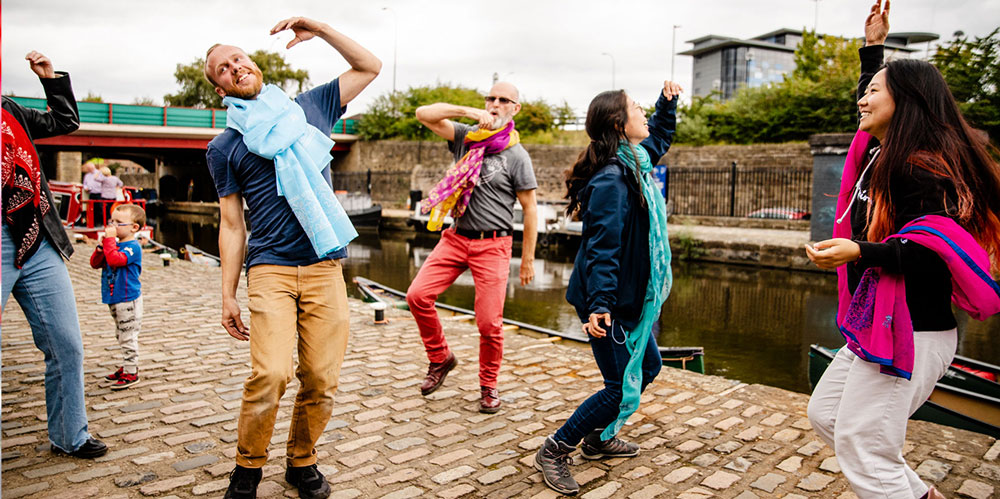
This is the myth which underpins The Light Tree Celebrations—a strange annual festival that has been going in Sheffield for over 200 years. A kind of magical harvest festival celebrating plants, stories, and the people who live in the communities along the Sheffield-Tinsley Canal.
This is what they will say in 200 years.
The story of the Hundred Light Tree and this celebration, emerged out of four years of work along the canal. Right now, it is brand new—but perhaps it will continue for two hundred years from now? Perhaps from our small interventions we’ll start something new which can also feel a bit ancient? How does a new tradition begin? Why not allow myths to emerge out of foraging walks, folklore swaps, meals, music workshops, weaving, the creation of many magical plants, and lantern-towing canoe trips?
But all this work wasn’t a means to this end—it was a disorganised tangle of conversations, joy, and creation. Partly due to covid, partly due to the nature of the work, and partly by design, this project was never about one final event. This project was fundamentally about finding excuses for people to gather—particularly around the theme of plants and plant folklore, and particularly along the canal.
Like the philosophies of permaculture we found that building on what is already there was the most rewarding. Understanding the ecology of a place and then figuring out where you can add value, or amplify existing energy allows for the best chance of a legacy. For example, the men’s group we worked with will continue to go canoeing (even when they’re not being asked to tow giant plant-themed lanterns around) and the Somali women’s group will continue to go for walks along the towpath without us.
Maybe we will continue to gather to celebrate the light tree next September and on and on. Because we need many excuses to gather and find places for joy, spectacle, new mythologies. Excuses to share a meal with friends and strangers. And plants (both real and magical) will always need celebrating.
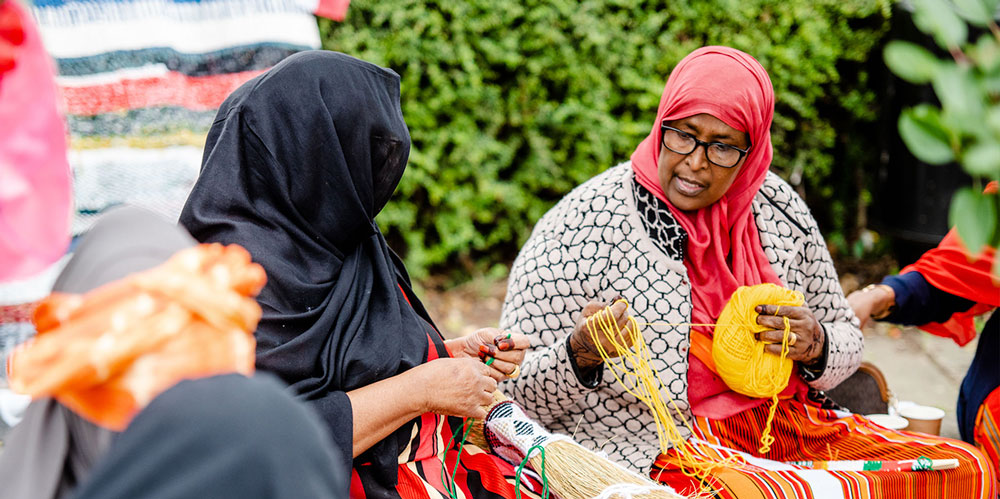
This work was funded by The Canal & River Trust as part of the Art on the Waterways programme. The wonderful team behind this work includes:
Producer: Cara McAleese / Linda Bloomfield
Writer: Joseph Houlders
Sound Designer: Lee Affen
Community Producer: Sally Proctor
Lighting / Projection Design: Will Monks
Animation: Aaron Howell
Spatial Design: Kate Morton
Community Events Producers: Saada Osman & Valentine Nlebedim
Production Manager: Jen Watts
Dance Workshop Lead: Kinder Kalsi
Permaculture / Plant Lead: Aimée Georgiou Lormand
Workshop Facilitator: Grace Darbyshire
As well as the support and energy of numerous community workers, creative facilitators, volunteers, and participants.

